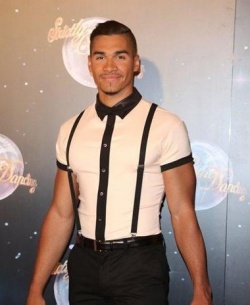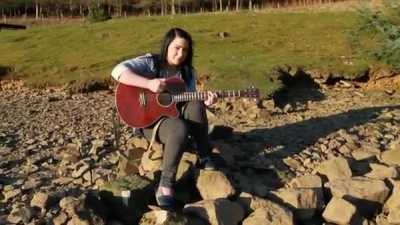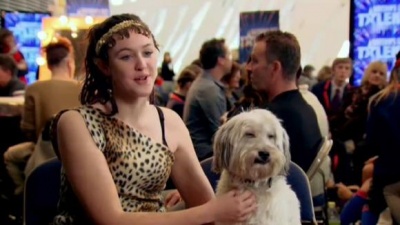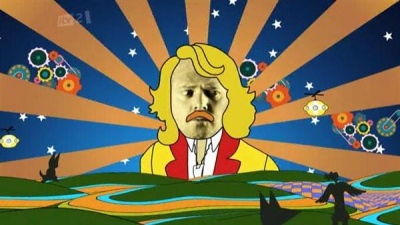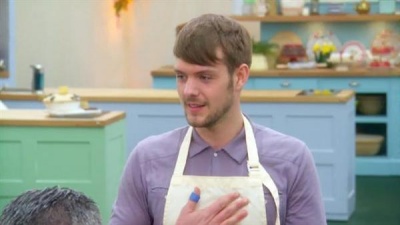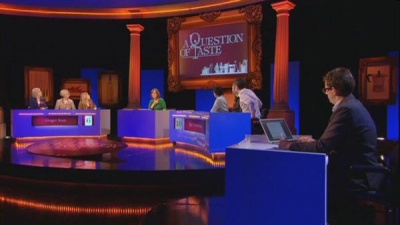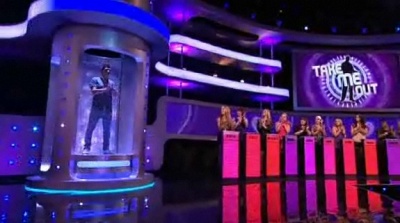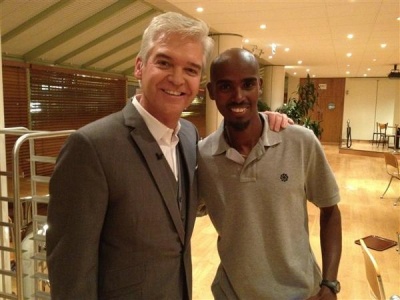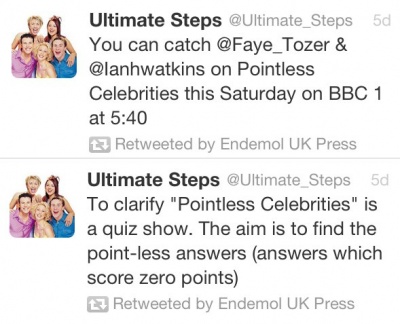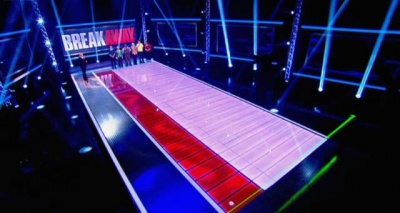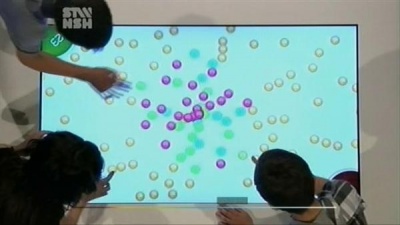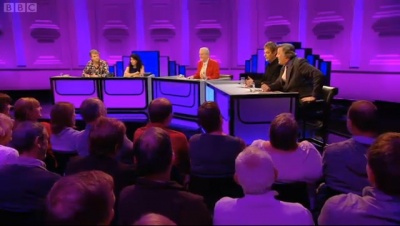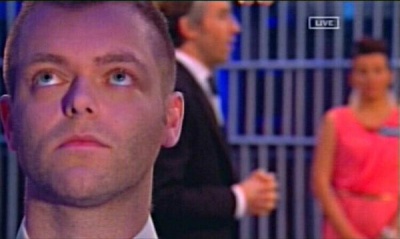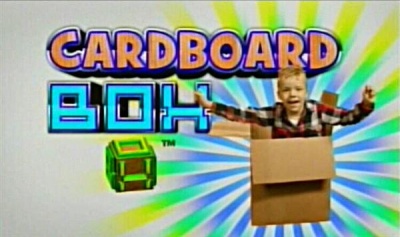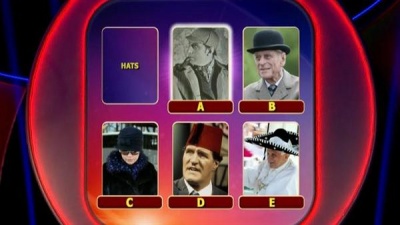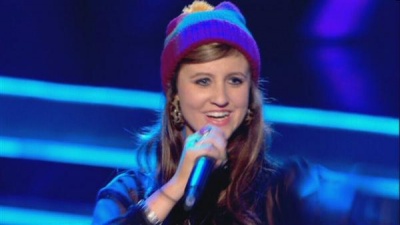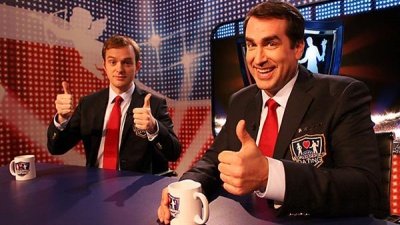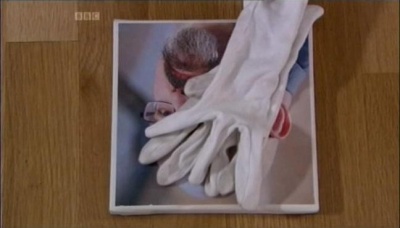Weaver's Week 2013-01-06
(rp) |
|||
| Line 30: | Line 30: | ||
</div> | </div> | ||
| - | [[Britain's Got Talent]] did its usual end-of-the-pier routine, and was won by a performing dog. In [[The Talent Show Story]], Simon Cowell had said that the only reason he set up the ''... Got Talent'' franchise was because he wanted to see a performing dog on the telly. Now that he's helped make ITV's Boxing Day entertainment [[That Dog Can Dance!]], is he happy now? Azerbaijan hosted the 2012 [[Eurovision Song Contest]], to which the BBC sent Englebert Humperdinck, hoping no-one would notice they'd confused it with the 1972 Eurovision Song Contest. The Corporation also had magic show [[The Magicians]], played to general ennui. ITV marked the summer of sport with [[Let's Get Gold]]; it tried to combine sport and entertainment and was perfectly serviceable viewing. BBC2 tried [[Maestro|Maestro at the Opera]], but it lacked Sue Perkins playing "Theme from ''The Simpsons''". | + | [[Britain's Got Talent]] did its usual end-of-the-pier routine, and was won by a performing dog. In [[The Talent Show Story]], Simon Cowell had said that the only reason he set up the ''... Got Talent'' franchise was because he wanted to see a performing dog on the telly. Now that he's helped make ITV's Boxing Day entertainment [[That Dog Can Dance!]], is he happy now? Azerbaijan hosted the 2012 [[Eurovision Song Contest]], to which the BBC sent Englebert Humperdinck, hoping no-one would notice they'd confused it with the 1972 Eurovision Song Contest. The Corporation also had magic show [[The Magicians]], played to general ennui. ITV marked the summer of sport with [[Let's Get Gold]]; it tried to combine sport and entertainment and was perfectly serviceable viewing. BBC2 tried [[Maestro (2)|Maestro at the Opera]], but it lacked Sue Perkins playing "Theme from ''The Simpsons''". |
ITV staged this year's Andrew Lloyd Webber musical show. [[Superstar|Britain's Got A Brand New Talented Jesus Christ Soapstar Superstar Strictly On Ice II +1!!]] sought the title role in the touring production of ''Jesus Christ Soapstar Superstar'', alongside Jason Donovan, Melanie C, and Chris Moyles. Two of those were on the panel; the latter's role was taken by Dawn French, presumably because she once played a vicar on the telly. It was full of slightly bad-taste religious jokes, slightly dubious singing, and (as we vaguely recall) a host who had all the stage presence of a wisp of smoke. Lord Lloyd-Webber regretted staging the show every night for a couple of weeks, it never built an audience. Putting it on just before that sporting thing didn't help. | ITV staged this year's Andrew Lloyd Webber musical show. [[Superstar|Britain's Got A Brand New Talented Jesus Christ Soapstar Superstar Strictly On Ice II +1!!]] sought the title role in the touring production of ''Jesus Christ Soapstar Superstar'', alongside Jason Donovan, Melanie C, and Chris Moyles. Two of those were on the panel; the latter's role was taken by Dawn French, presumably because she once played a vicar on the telly. It was full of slightly bad-taste religious jokes, slightly dubious singing, and (as we vaguely recall) a host who had all the stage presence of a wisp of smoke. Lord Lloyd-Webber regretted staging the show every night for a couple of weeks, it never built an audience. Putting it on just before that sporting thing didn't help. | ||
Current revision as of 17:08, 6 October 2021
Last week | Weaver's Week Index | Next week
Well, the world appears not to have ended on either 21 or 23 December, which means we do get to publish the Week of the Year. This year, we're dividing shows by genre, starting with the most popular.
Contents |
The Year In Talent And Variety Shows
Talking point for most of the autumn was the success of Strictly Come Dancing, especially when compared to The X Factor. According to overnight ratings, Strictly recorded 12 million viewers in its last three weeks, The X Factor only just passed 10 million for its final showing, with ITV and Simon Cowell reported to be concerned that their show wasn't as popular as it was.
What happened this year? Strictly had a particularly strong cast, with Denise Van Outen bringing prior experience, Kimberley Walsh learning quickly, and Louis Smith and Dani Harmer being young and enthusiastic. Darcey Bussell came onto the judging panel, with a deliberate plan to emphasise the positive and encourage people to improve. The result was a feelgood, warm, cosy programme, one that people could plan their weekends around.
To this end, Strictly benefited from a bold piece of scheduling: the BBC controllers decreed that it would start at 6.30, and end when it ended. ITV didn't want too much of an overlap between Strictly and The X Factor, meaning that their show had to wobble around the schedules, starting somewhere between 8 and 8.30, and often running well past 10pm. That's too late for young children, hurting the ratings.
On its own merits, The X Factor had a forgettable year. The rules were tweaked to allow people to perform their own songs, which brought quirky songwriter Lucy Spraggan on board. A barnstorming audition was the high point, and she withdrew from the live finals after three performances. Spraggan's wit and talent will take her far, but mass-appeal fame wasn't coming from this show. Instead, the finals were contested by two pretty boy singers and an older performer with a fondness for unthreatening material and a spectacularly anodyne style. If one can be spectacularly anodyne, he was. As ever, the performances were overshadowed by discussion about the judges, but even their antics were bland re-treads of previous years. James Arthur won, and claimed the inevitable number one single.
Every reality show winner has a number one single, or at least a top-five tune, right? Wrong. Remember The Voice of Holland UK? It got off to a massive start, courtesy of the Marvellous Mechanical Spinning Chairs, allowing the audition process to be based on the performance and not the looks. But after the chairs stopped spinning, it all went terribly wrong: the supportive atmosphere was blown up in the Shouts Louder battle round, and live performance shows started confusing and ended predictable. It was all a tremendous mess, and winner Leanne Mitchell failed to trouble the singles chart with her release. Producers promise more Marvellous Mechanical Spinning Chair action next year (hooray!) but also more Shouts Louder battle round (boo) and about three live performance shows.
Britain's Got Talent did its usual end-of-the-pier routine, and was won by a performing dog. In The Talent Show Story, Simon Cowell had said that the only reason he set up the ... Got Talent franchise was because he wanted to see a performing dog on the telly. Now that he's helped make ITV's Boxing Day entertainment That Dog Can Dance!, is he happy now? Azerbaijan hosted the 2012 Eurovision Song Contest, to which the BBC sent Englebert Humperdinck, hoping no-one would notice they'd confused it with the 1972 Eurovision Song Contest. The Corporation also had magic show The Magicians, played to general ennui. ITV marked the summer of sport with Let's Get Gold; it tried to combine sport and entertainment and was perfectly serviceable viewing. BBC2 tried Maestro at the Opera, but it lacked Sue Perkins playing "Theme from The Simpsons".
ITV staged this year's Andrew Lloyd Webber musical show. Britain's Got A Brand New Talented Jesus Christ Soapstar Superstar Strictly On Ice II +1!! sought the title role in the touring production of Jesus Christ Soapstar Superstar, alongside Jason Donovan, Melanie C, and Chris Moyles. Two of those were on the panel; the latter's role was taken by Dawn French, presumably because she once played a vicar on the telly. It was full of slightly bad-taste religious jokes, slightly dubious singing, and (as we vaguely recall) a host who had all the stage presence of a wisp of smoke. Lord Lloyd-Webber regretted staging the show every night for a couple of weeks, it never built an audience. Putting it on just before that sporting thing didn't help.
The Year In Celebrity Shows
It wasn't just the public who showed their talents. I'm a Celebrity... Get Me Out of Here! returned for its tenth anniversary series, but couldn't disguise the fact that it had run out of ideas circa 2005. Dancing on Ice was the traditional spring ratings banker for ITV, though came off second-best to drama Call the Midwife. The BBC staged Let's Dance for Sport Relief; we suspect that the latter series is coming to the end of its natural life. Though Who Wants to be a Millionaire had a short The People Play series in the summer, we're going to treat it as a celebrity show, alongside the autumn run of Mr and Mrs and the spring series of Family Fortunes. Channel 4's 8 Out of 10 Cats continued along its merry way, with a couple of games of Countdown, for no reason other than they could.
ITV2's biggest show is Celebrity Juice, an entertainment that is what Radio 4's I'm Sorry I Haven't a Clue would like to be. The format uses both inventiveness and familiarity, and requires a host who can carry the programme. This may be the problem with the Keith Lemon character: people who like him, they really love him. People who don't like him, they really don't like him. A similar argument applies to Jack Dee, who has been the guest host of ISIHAC since 2009. We randomly heard an episode from 2000 over Christmas, and were struck with the way Humph made the same material actually funny. ITV tried to move Keith Lemon into Saturday evening with LemonAid, but viewers preferred something a little less fizzy.
In this section, we note the resurgence of Have I Got News for You. Many things work against it: the show continues to feel like an old boys' network, very rarely casting more than a single token woman. The Friday evening edit often feels choppy, there are a few too many video clips taken off of the internet, and the 45-minute edit is slotted wherever BBC1 can be bothered – more than once, it's been on Wednesday night, six days after being recorded. Yet when they have a good week – when the host is on form, or Hislop has a reason to get a bit ranty, or Merton has room for a flight of fantasy – it's entertaining and very gently informative programming. We caught last year's Christmas edition repeated on Dave, with Hislop banging on about tax deals. That's only been a leading topic in the news this year.
The Year In Reality Shows
We're doubtless going to get shouted at for putting The Apprentice down as a reality programme. Concocted and semi-scripted tasks, edited to within an inch of their life, played by characters who may or may not be accurate representations of people, leading up to an entirely-scripted show finale? It's a reality show, with Alan Sugar filling the role of Big-Headed Brother. And it remains a ratings success for BBC1, clearly the audience likes to see yuppies making fools of themselves. For contractual reasons, the Beeb's obliged to show Celebrity Apprentice from Yankeeland; they choose to make a Young version of the show.
Far more appealing are the cookery programmes across the corporation. The Great British Bake Off began the year with a celebrity competition for Sport Relief, and ended it with a place in the top ten most-viewed shows. GBBO has also won all sorts of national and international awards – Golden Rose, BAFTA Best Feature, Show Most Likely to Beat the England Football Team, and Best Show Hosted by a Comedy Double-Act, beating off Ant and Dec and Jedward. Masterchef has continued on its merry course, with a Civilian, Celebrity, Junior, and Professionals series all crowning at least one winner. Masterchef has also been sold to Ireland, allowing some lucky or devoted viewers to see three shows in one day. BBC2 tried a modern cookery quiz in primetime, A Question of Taste suffered only from making Kirsty Wark the host and relegating William Sitwell to a (literal) corner.
Cookery and catering continued to be a mainstay of daytime shows: Great British Menu (BBC2) used the Queen's jubilee as an excuse for a contest. Handmade Revolution was a nostalgic look at traditional crafts. Come Dine with Me (Channel 4) continued to be the acceptable face of reality television, thanks to Dave Lamb's snarky voiceover. Four in a Bed took the same idea and applied it to bed-and-breakfasts. Britain's Best Bakery (ITV) was a competition for professional bakers, the sort disqualified from Great British Bake Off, and what we saw was indistinguishable from GBBO, apart from the way neither of the hosts could be expected to conduct an orchestra. Channel 5 gave the surprisingly watchable Kitchen Wars with Marco Pierre White. Channel 4 spent a week running Hotel GB, which combined a charity appeal with awareness of youth unemployment, and just about made good social action telly.
Masterchef is a huge success across the world. Pay-tv channel Watch has bought up the Australian version, which runs for about sixty episodes and brings in a quarter of a million viewers here; on free channel Really, they're showing New Zealand and (from next week) South African editions. Satellite channel Hi-tv caters for expatriate Nigerians, and has aired their versions of Pop Idol and ... Got Talent; the Yankee versions go out on ITV2. We might choose to class World's Strongest Man as an import (it's made by a foreign company, in non-rainy and foreign lands); it's remained a success on the Eurosport network, Channel 5, and the Challenge? channel.
ITV's dating show Take Me Out was renewed for two more series, and it looks like the show has found its niche – edgy without being crude, innuendo without being rude. Don't read too much into the way ratings fell during the autumn: any show opposite Strictly will stumble. Less success for E4's Love Shaft, acceptable for Monday evenings, but a bit rich when repeated on Saturday morning telly. They have Noel Edmonds around, he knows about Saturday morning telly. Coach Trip had a celebrity and civilian run in the spring, a fact we'd forgotten. We also forgot about Four Rooms, which lost Emma Hawkins, relied on Jeff Salmon's dice, and lost.
Over on Channel 5, Big Brother continued. As seems to be the way, the series was interesting for the first four weeks, then the last contestant with a brain left the show, and the producers made the conscious decision to keep in a contestant who had threatened injury against another contestant. It feels like ill-considered, shoddy, and undisciplined production, which is why it's been renewed into 2015. On the same channel, Secret Interview combined hidden-camera stunts with offers of a job. BBC3's Britain Unzipped was a mildly educational state-of-the-nation poll, and ITV2's The Exclusives gave a job and lots of publicity to Bauer's stable of magazines. Jewish Mum of the Year (C4) left us uncomfortable; the judges clearly had an idea of what they wanted their winner to be, but couldn't communicate that to the viewers, or design tasks to test the relevant abilities, and the result was a cringeworthy point-and-laugh show.
The Year In Jackpot Shows
Huge prizes were awarded by three big jackpot programmes (they fit somewhere between reality and quiz). Deal or No Deal paid out for its £250,000 box on a Sunday in midsummer. It's only the fourth time The Big One has gone, and the DOND fandom (yes, such a thing does exist) makes much of the way all four Big One winners have been young women.
Over on ITV, The Cube paid out its £250,000 jackpot, conquered by a man with nerves of steel and the skill of an archer. Mo Farah, a runner from London, went on to win some other stuff. The Cube fandom (yes, such a thing does exist) wonders if the challenges can be won by anyone who isn't a superhuman.
The year's biggest cash prize was awarded by Red or Black? 2.0, the Cowell-and-Ant-and-Dec game of guesswork. For the new series, some of the guesswork was replaced by skill and prediction, but it still felt terribly banal and random. The show will be remembered for answering the question of "red, or black?" with "an indeterminate shade"; bad design made it possible for the show's big finish to end in the transition between red and black, and Murphy's law ensured that this would happen. Thanks to rollover jackpots, the top prize was £1,500,000, the biggest amount ever awarded in UK television history. The Red or Black? fandom——actually, that thing does not exist.
The Year In Quiz Shows
As measured by ratings, the most popular quiz show of the year was Who Dares Wins, ahead of In It to Win It. Both of these lottery spin-offs are back in the new year; Secret Fortune isn't, and we find that a slight shame. Pointless gained celebrity editions for Saturday, while its teatime rival The Chase has been riding up the ratings. Both shows have their strong points – Pointless is fun, The Chase is a vam-vam-vam quiz. Both have their weaknesses – the Pointless final round might be getting too obscure, The Chase is basically the one round played four times. Neither show is going anywhere, and everyone knows about them. Well, almost everyone. The Steps Fan Club (yes, such a thing does exist) sent a message in October.
Also fixtures in the schedule are BBC2's evening quizzers. With its prolix quarter-final stage and a Christmas tournament, University Challenge is now running to 49 editions a year; Mastermind has a comparatively brief 41 shows, a quarter contested on BBC1 by celebs. Eggheads continues to be the cornerstone of 6pm, and QI has settled back in on the second button after an ill-advised excursion to BBC1. Perfection also came back for a second run in the afternoons. Over on Channel 4, The Million Pound Drop Live continues to fill huge chunks of the weekend schedule without inviting any civilian over 35.
What of new quizzes? ITV's Tipping Point surprised us during the summer: four rounds of moderately simple questions, but these were only tokens to extract the real reward from the Tipping Point Machine: other, similar tokens. It was utterly simple and intellectually undemanding, yet strangely compelling. On the same channel, Don't Blow the Inheritance tried to encourage inter-generational teamwork, though the result was a little too plodding for our tastes. The Exit List was a multiple-choice quiz for six-figure prizes, but to win the prize players had to recall all the correct answers they'd given during the course of the game. It would have been a decent show, so long as the pacing was absolutely right. ITV decided to make all the episodes an hour long, when the game had a natural length of about 40 minutes, and the disaster was predictable.
Daytime brought two more new quizzes. 1001 Things You Should Know was an elegant little game, ably hosted by Sandi Toksvig, though the lack of any consolation prize hurt. No such problems on Breakaway, where Nick Hancock pleads for the team to be ruthless and play for themselves. Many of the problems in the first series were fixed by the autumn, and we reckon this could be the sleeper hit of the year. In spirit, it's not a million miles from The Weakest Link, which finally ended this March, the same month when web gem Accumulate! ceased building its towers from paper plates and cups. Countdown continued on its merry way, we're not terribly impressed with new host Nick Hewer, but the standard of competition remains high, and if Channel 4 axes Countdown, they may as well close down entirely.
Digital channels weren't afraid to ask difficult questions. Dara Ó Briain fronted the School of Hard Sums on Dave, explicitly bringing mathematics into everyday life; with Dara, a maths prof, a comedian, and two real-life maths students all working on the problem, some sort of learning was inevitable. Challenge? made a new run of Blockbusters, which attracted much publicity but soon faded from consciousness because it was just the original with less Bob. Over on BBC4, Only Connect had its sixth series of impossibly hard brainstumpers, ably fronted by the wit and wisdom of Victoria Coren. Such was Only Connect's popularity that they were able to get A-list celebrities on the show, and to break through a million viewers on BBC4. Only Connect has the big advantage of being warm and welcoming and inclusive, even when we've no clue what they're on about.
The Year In Children's Shows
Mostly, children's shows equates to BBC commissions. There's been a new run of family-friendly show Copycats, of performance shows Glee Club and Street Dance Stars, of capitalist show Trade Your Way to the USA, and of education-and-gunge show Gory Games. There was also education-and-bonkers show Jedward's Big Adventure. Though it aired on primetime BBC2 (well, primetime as in opposite the Britain's Got Talent final), Off By Heart: Shakespeare was a contest for children, and could have gone out on the CBBC channel. Young sports people were well-served this year. The BBC gave wall-to-wall coverage of the Youth Winter Olympics, and some of the greatest competed in Ultimate Sports Day. We weren't entirely convinced by the national teams, but we were deeply impressed by the commitment and skill shown by the youngsters.
Similar thoughts crossed our mind while watching Nickelodeon's new series of Camp Orange. This year's series was decided by a viewer vote, giving a reason to watch, but making it utterly impossible to repeat the series after the summer. We fear that a similar problem will befall S4C's Y Lifft; it's a second-screen show, one that makes more sense when seen and played at the same time.
And here's the big surprise. ITV commissioned a new children's game show, the first time that's happened since about 2004. And not only that, they made a really good job of it. Fort Boyard: Ultimate Challenge has aired in two versions this year. In the spring, a co-production with Disney XD was FB: Turbocharged, cramming four games and a Maîtres challenge and the treasure room into 20 minutes. The December series has been Fort Boyard: In the French Style, with three races and six solo games, and a running joke about host Andy Akinwolere not being able to take part. With only the smallest of changes (a lock-in mechanism), this show could go out in ITV primetime.
The Year In Radio
Just a Minute marked its 45th anniversary with three regular radio series, a couple of episodes in India, and a two-week residence on BBC2 television. We do tremendously hope that Nicholas Parsons is able to mark the golden jubilee in four years' time. But we also note that JaM has very successfully kept its panel young and fresh – Paul Merton and Sue Perkins are perhaps as good as Kenneth Williams and Clement Freud, Marcus Brigstocke is always welcome, Gyles Brandreth has something to add. And there are more talents lurking – Ruth Jones and Jason Manford impressed us in the television show, and Paul Sinha is as good here as he is on The Chase.
Radio 4's Monday lunchtime quizzes have remained at 3pm. Brain of Britain, Round Britain Quiz, Counterpoint, and Quote... Unquote have again been joined by The 3rd Degree. Paul Bajoria produces most of these shows; while he is very good at the job he does, we'd be more comfortable with at least one show produced by someone else.
Elsewhere, Radio 4 gave the forgettable It's Not What You Know, and the Gyles Brandreth entertainment Wordaholics. The News Quiz continued, and did a better job of making its old material look new than other programmes on the network. The Unbelievable Truth also continued; we've never liked smuggling fact into otherwise nonsense. Radio 2 made a number of one-off shows, and Radio Wales had another run of their topical quiz What's the Story? Radio Ulster gave us the hyper-local quiz IQ/NI, and Radio Scotland enlisted Clive Anderson on The Guessing Game. This last is probably the most dull radio show it's been our misfortune to hear all year, and that includes an hour of Richard Keys (he's got no knees) on Talk Radio UK.
Recurring Items
Over the year, we've been noting the decisions reached by broadcasting regulator OFCOM. Late in 2011, the regulator commissioned some research into public attitudes to bad language. While researching this round-up, we realised that we'd not seen the research, and don't know if the public survey somehow managed to lead the respondents to the conclusion it had in mind. We do note that OFCOM has used this research as a reason to introduce new interpretations of rules – where it was once presumed acceptable to use the F-word just after 9pm, this sort of language now presumes to attract official censure. This column's view is that society as a whole is not becoming less permissive, and OFCOM's decisions in this respect don't accurately reflect generally-held standards in the way they claim. We accept that OFCOM can and should be a little bit less liberal than the median of society.
Our main problem is the way OFCOM restricts its attention to a very narrow broadcasting code. Airing 12 minutes and 1 second of advertising in a clock hour is going to incur their wrath. Discriminating against people over 35 – as The Million Pound Drop seems to do – is not against any specific regulation and hence acceptable. Having a sponsorship credit that looks too much like an advert is not allowed; having a sponsorship credit that encourages usury is fine.
The television and radio spectrum is a very limited resource, and its use should be a matter of legitimate public debate. The government-appointed regulator refuses to engage in that debate. By closing down discussion at the earliest opportunity, all that happens is that people make the same complaint, OFCOM will continue to knock back the points, and everyone gets increasingly unhappy and embittered. We encourage the government to address this state of affairs, and either give OFCOM relevant powers or explain why not.
The other recurring theme through 2012 was how Channel 4 had the reverse-Midas touch: the channel had an unerring ability to turn gold into base metal. Perhaps this started with their memorable coverage of the 2011 World Athletics Championships, which was of such high quality that they missed Usain Bolt in the final.
This year has been failure piled up upon failure. It began with The Bank Job, which should have been brilliant – a quiz testing knowledge and strategy and knowing when to get out, and all set in a real bank vault. The online qualification game won plaudits and prizes, and deserved them all.
The television show? Not so good. It began with a Technical Fault caption, ended with The Colour Bars of Doom, and had almost all sorts of error in between. We can forgive them the choice of George Lamb as the host, a show's allowed one error. We can't forgive the decision to make the show live, as the combination of "live show" and "non-studio setting" is going to lead to Major Fowlup making an appearance in every show. For reasons of style, the host didn't use question cards, but a tablet computer, one that kept dropping out of reception. And, just when we thought the show had finished, it turns out the producer is the one person on the entire planet who believes the Shafted endgame made for fulfilling television. The show was such a mess that even a move to daytime proved impossible – we suspect that it was meant to appear in the 3.30 slot during 2012, but couldn't make it, and 1001 Things was shunted from September to November to fill the hole.
The 3.30 slot? Another of Channel 4's own goals: with daytime full with successful shows, the schedulers decided the only room for a new programme was at half-past three, pushing Countdown back to a ludicrously early 2.40 start. This is the one reason why we're not calling their new digital channel 4seven a complete waste of space: for much of the day, it works as Channel 4+2, allowing Countdown to air at 4.40. Viewers were promised the ability to write the schedule and dictate what went out on 4seven, but this has never happened.
Not even wall-to-wall repeats could save The Mad Bad Ad Show, which did at least warn us that it was a) about advertising and 2) bad. That's "bad" in the sense of "complete rubbish", and Channel 4 told us that it had had "execution problems". Make your own jokes. Stung by the reaction, Channel 4 made hefty edits to A Short History of Everything Else, chopping it from an hour to 30 minutes, but even this abbreviated form wasn't enough to hide the fact that it was a new version of Have I Got Old News For You: a clip of Swampy down a drain from 1996 allowed Micky Flanagan to make the same joke he'd made in 1996.
But there was more to come from Channel 4's creative renewal. "Funny Fortnight" in August was neither funny nor a full 14 days. Comedy World Cup was an exciting new commission for Saturday evenings, so obviously they're going to put it out in the bit of Saturday evening when Strictly and X Factor are on, and then fill the programme with Jason Manford repeating the same routine he'd done on another show a week earlier.
The cherry on top was Baggage, in which Gok Wan invited some young people to parade their insecurities and foibles, even before they'd started dating. Such was the popular reaction to this high-quality programme that it was promoted, from Channel 4 to E4, and from prime-time on Friday to tea-time on Saturday.
Seriously, we'd like to like Channel 4. Sometimes, they really make it very difficult.
Top Bits
From the negatives to the positives, and the Game Show Hat panel has been in session. They note the contribution of Pointless Celebrities, but Xander and Richey have rather missed the point: rather than asking questions about hats, they're to be worn and made to look stylish and cool. Victoria Coren entered a headband and Pudsey ears, and the Dutch entry to Eurovision a feather headdress. Both of these may have been guilty of trying a bit too hard; Ms Coren, in particular, is stylish and cool in all circumstances.
The Exclusives was full of hats, both from the competitors and product such as Peter Andre. The winner was always likely to come from The Voice: Bo Bruce and Emmy J Mac sported classic lines, Max a very sporty grey number, and Jaz Ellington a proper titfer. Our award goes to the tea-cosy sported by Frances Wood in her audition, the only point of colour in a restrained outfit.
The shows we've most enjoyed this year begin with World Series of Dating (BBC3), in which speed dating is treated as a non-contact sport, complete with a referee and over-the-top commentators. It was perhaps a little thin to be more than a one-off curiosity, but it had us laughing more than anything Channel 4 made all year.
Top Dog Model (ITV2) took us by surprise: we don't have much fondness for dogs, we don't particularly like fashion shows, so the combination was something we were quite prepared to say, "not for us". But the show had a wonderful joie de vivre, a humility and charm. Part of it was the way we had to suspend disbelief for some of the tasks, much of it was in David Walliams' commentary which so helped us to suspend disbelief.
The Exhibitionists (BBC2 Wales) had a simple idea: take some people, train them in the world of art, give them a room in which they can mount an exhibition. From this simple idea came a crash course in art history, the work of the museum curator, and how to use paintings and sculpture and light and shade to shape an idea and make a point. The Exhibitionists had the most simple and spectacular elimination possible: never has the dropping of a pair of gloves symbolised so much.
And 21 Questions Wrong, the ever-so-tense against-the-clock challenge to get lots of either-or questions wrong, and potentially win a large prize. Breakaway may be the best television quiz of the year, but we reckon 21QW is always worth a listen.
This Year And Next
The coming year promises to be interesting. Already lined up for next week are Britain's Brightest (BBC1, 7.10 Saturday) and Splash! (ITV, 7.15 Saturday), Dancing on Ice (ITV, 7.45 Sunday) and the Only Connect Championship of Champions (BBC4, 8.30 Monday). Next week also has Face the Clock (C4, 3.30 weekdays), Jedward's Big Adventure (CBBC, 4.30 weekdays), Masterchef South Africa (Really, 7pm weekdays), Masterchef Ireland (Good Food, 10pm weekdays), Aibisidh (BBC Alba, 8.30 Monday), Gleusta (BBC Alba, 6.35 Tuesday), and Dan Glo (S4C, 6pm Friday).
Later in the year, we're promised I Love My Country (BBC1), which sounds completely bizarre; My Man Can (ITV), in which spouses bet on their husband's ability; and The Common Denominator (C4), linking otherwise unrelated concepts.
Now that analogue switchoff is completed, Mr. Digit Al's path to world domination can continue, with a raft of new, local, channels. We're promised twenty new broadcasters this year, most of them broadcasting to a single city or county. All of them have promised to make lots and lots of new programmes, but given the lack of money in the market, we suspect than most of these new programmes will be cheap. Game shows are cheap. We live in hope.
At least, we live in hope until April when 2.8 Hours Later brings their new Asylum game to town, after which we'll probably be undead in hope. Our other adopted vaguely-game project Legend in Japan will be hitting the road and praying it doesn't snow on them – the tour is scheduled for the first week in February.
The Roll Of Honour
(All results as transmitted are final)
The Great Sport Relief Bake Off – Anita Rani
The Great British Bake-Off – John Whaite
Celebrity Big Brother
(January) – Denise Welch
(September) – Julian Clary
Big Brother – Luke Anderson
Coach Trip (celeb) – Derek Martin and John Altman
(civilian) – Stuart and Craig
Brain of Britain – Ray Ward
Cân i Gymru – Gai Toms and Philip Jones, for "Braf yw Cael Byw"
Masterchef – Shelina Permalloo
Celebrity Masterchef – Emma Kennedy
Junior Masterchef – Tom Barlow-Kay
Masterchef The Professionals – Keri Moss and Anton Piotrowski (joint winners)
Masterchef Ireland – Tamarin Blackmur
Let's Dance for Comic Relief – Roland Rivron
University Challenge – Manchester (Tristan Burke, Luke Kelly, Michael McKenna, Paul Joyce)
Accumulate! – Team Turtle (Thom Dixon, Callum Stacey, Daisy Dixon)
Glee Club – The Real Deal
Dancing on Ice – Matthew Wolfenden & Nina Ulanova
Ultimate Sports Day – England (Allard Newell, Emily Attfield, Leo Clark, Shanice Norton)
Just a Minute
(spring) – Marcus Brigstocke
(tv) – Sue Perkins
(summer) – Gyles Brandreth
(autumn) – Pam Ayres
(overall) – Gyles Brandreth
Feirm Factor (TG4) – Pat O'Connor
Fferm Ffactor (S4C) – Dilwyn Owen
The Voice of Holland Ireland – Pat Byrne
The Voice of Holland UK – Leanne Mitchell
World Series of Dating – Ben
Trade Your Way to the USA – Street Smart Sellers (Tommi, Maddie, Evie)
Mastermind – Gary Grant
Celebrity Mastermind (Ireland) – Rick O'Shea
Junior Mastermind (Ireland) – Jack Meenan
BBC Young Musician of the Year – Laura Van Der Heijden
Eurovision Young Musicians – Eivind Holtsmark Ringstad
Britain's Got Talent – Ashleigh Butler and Pudsey
Off By Heart: Shakespeare – Nuha Bazeer
Eurovision Song Contest – SVT, for "Euphoria" (music and lyric: Thomas G:son & Peter Boström, performed by Loreen)
Junior Eurovision – NTU, for "Nebo" (music, lyric, performance: Anastasiya Petryk)
The Apprentice – Ricky Martin
Junior Apprentice – Ashleigh Porter-Exley
The Exclusives – Ellie Henman
Countdown
(June) – Jack Worsley
(December) – Paul James
Counterpoint – Michael Pitwood
The Exhibitionists – Efa Thomas
Rostrum Camera – Ken Morse
Kitchen Wars – Olivier Guyard and Sheila Guyard-Mulkerrin
Britain's Got A Brand New Talented Jesus Christ Soapstar Superstar Strictly On Ice II +1!! – Ben Forster
Camp Orange – Moon Waffles (Hannah and Amanda-Jane)
Alesha's Streetdance Stars – Future Pride
One Man and His Dog Live – Wales
Celebrity Salon – Philip Olivier
Britain and Ireland's Next Top Model – Letita Herod
Top Dog Model – Simba and Dan Carrick
Comedy World Cup – Johnny Vegas, Josh Widdicombe, Mick Miller
Celebrity Bainisteoir – Calum Best
Radio 2 New Comedy Award – Lucy Beaumont
Round Britain Quiz – Wales (Myfanwy Alexander, David Edwards)
I'm a Celebrity... Get Me Out of Here! – Charlie Brooks
Simon Cowell Annoys – James Arthur and Simon Cowell
Only Connect – Scribes (Dom Tait, Holly Pattenden, Gareth Price)
Britain's Best Bakery – Hambleton Bakery
Strictly Come Dancing – Louis Smith
That Dog Can Dance! – Lucy and Indie
Superstars 2012 – Anthony Joshua and Helen Glover
The Week will return on 13 January, when we plan to comment on ITV2's Fake Reaction.
To have Weaver's Week emailed to you on publication day, receive our exclusive TV roundup of the game shows in the week ahead, and chat to other ukgameshows.com readers, sign up to our Yahoo! Group.

